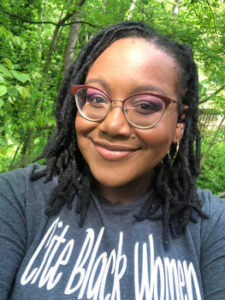Brionca Taylor is a doctoral candidate in sociology. She received her bachelor’s degree in sociology and African American studies from the University of Florida, where she was one of the first recipients of the university’s African American studies degree. She is the recipient of a National Science Foundation (NSF) Graduate Research Pre-doctoral Fellowship and a UNC Institute of African American Research Graduate Student Summer Research Grant.
What made you choose UNC-Chapel Hill when deciding on a program/place to study?

I participated in the Moore Undergraduate Research Apprentice Program (MURAP), at Carolina, the summer before my senior year of undergraduate studies. MURAP taught me about graduate school and gave me a close network of friends who still serve as my support system. Most importantly, MURAP introduced me to my mentor, Dr. Kia Caldwell, and my current advisor, Dr. Karolyn Tyson. Both were very supportive as I completed my summer research project and continued to be after the program ended. Everyone stressed the importance of mentorship during your doctoral studies and I knew UNC would offer me great mentors who were already invested in my success. Resources at Carolina were also unmatched, and it is relatively close to my home in Florida (as compared to other programs). The academic and personal support formed a great combination and made my decision easy.
Tell us about your research.
My dissertation explores the role of emotions, race, and gender in Temporary Public Alternative (TPA) schools, which students with labeled academic and behavior issues attend short-term throughout the school year. I originally planned to study students who attended TPAs, but as I conducted my fieldwork, I became fascinated by the teachers. Stress and burnout seemed to be a problem among the teaching staff, and turnover rates seemed very high. In one school year, about 70% of teachers at my research site were new! Talking with teachers and school administrators, I learned this was not uncommon in TPAs.
I use a sociology emotions framework and qualitative methods to examine the emotion management  strategies teachers use to navigate their primary role as, what I am calling, “emotional educators.” I investigate the ways teachers attempt to teach students the emotion rules, which are the expectations and displays of emotions that society deems necessary for school and life success – like managing anger, feeling happiness, and expressing deference. As the majority of students at TPAs are Black middle and high school-aged boys, I also explore the racialized and gendered roles of Black men and Black women at TPAs and how they are necessary for the structure of TPAs in school districts.
strategies teachers use to navigate their primary role as, what I am calling, “emotional educators.” I investigate the ways teachers attempt to teach students the emotion rules, which are the expectations and displays of emotions that society deems necessary for school and life success – like managing anger, feeling happiness, and expressing deference. As the majority of students at TPAs are Black middle and high school-aged boys, I also explore the racialized and gendered roles of Black men and Black women at TPAs and how they are necessary for the structure of TPAs in school districts.
How have you built community as a graduate student at Carolina?
I’m thankful to have a supportive and collegial department. I’ve found my community from taking classes at Carolina and from participating in the department’s Race Workshop. I’ve also been attending Writing Wednesdays through IME since my first year at Carolina and that gave me a great writing community and lifelong friends. When I found out I won my NSF fellowship, I remember whispering it to a friend during Writing Wednesday. Others overheard and gave me so many congratulations, hugs, and love. And we were still pretty much strangers! That celebratory community has gotten me through graduate school.
What are you hoping to accomplish with your Carolina degree?
I want to find a way to apply my research and do more to assist teachers, especially teachers of color working with Black and Brown students. Teachers have great personal support systems and need more structured support from educational organizations. I’d love to partner with mental health researchers and educational policymakers to develop and evaluate mental health support systems and issues of equity and inclusion for teachers working in high need areas. Students of color deserve teachers who have the capacity to understand, care for and support them as they navigate school systems. I think my sociology degree with a focus on education, race, gender, and emotions will be beneficial in advocating for teachers and students in the future.
